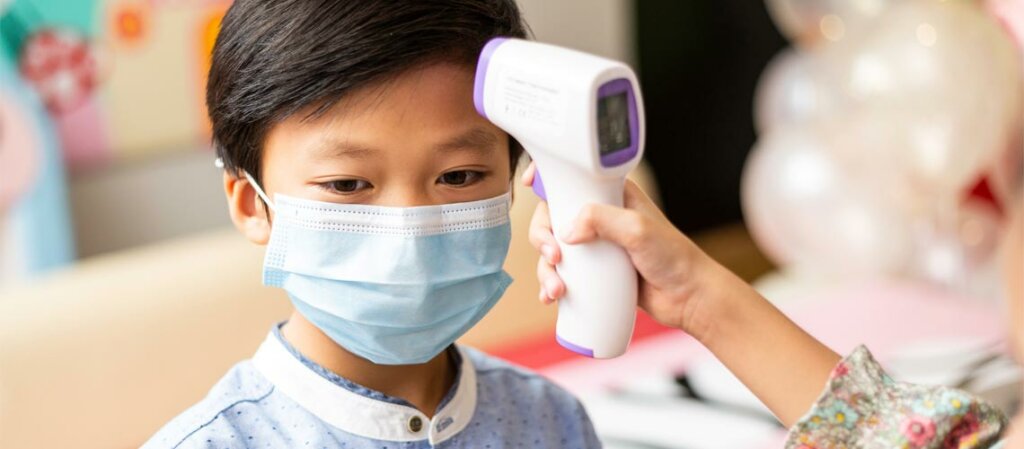Do you seem to notice that your child has symptoms of COVID-19? What are the main or most common signs and symptoms? What should you do? Lots of questions keep coming to your mind, and now you are probably scared and anxious. Just keep calm and stay focused. The majority of children who develop COVID-19 will experience only mild symptoms, and the severe disease is rare among children. In fact, about 19% of children have been reported with COVID-19 cases in the U.S. since the pandemic began.1 All we need to do is learn those signs and symptoms, look at the duration of the symptoms , and search for the medications available. Moreover, closely monitoring your child’s health with remote patient monitoring will give you a peace of mind. Remote patient monitoring can help you detect a rise in temperature, respiratory depression, heart rate variability and common symptoms of children who catch the virus.
Here are the common signs and symptoms of children who catch COVID-19.
COVID Signs and Symptoms in Children
Children with COVID-19 might experience few or many symptoms, or no symptoms at all. But the most common symptoms of COVID-19 in children are cough and fever. Also, there might be pain in the chest, pain in muscles, loss of taste or smell, changes in skin coloration in some areas of the feet and hands. Some may have chills, sore throat, nausea, vomiting, belly pain or diarrhea, fatigue, severe headache, and nasal congestion.
Be sure to follow up with your doctor once your child has had a fever for more than three consecutive days, is having trouble breathing or drinking, and does not urinate at least three times in 24 hours. In some cases, your doctor might offer a telehealth service to monitor your child’s condition in real-time. If your child’s condition is getting worse , or if you have some important questions and concerns, be sure to contact your doctor Some of the emergency warning signs are trouble breathing, consistent pain or pressure in the chest, new confusion, inability to wake or stay awake. Be alert for pale, gray, or blue-colored skin, lips, or nail beds, (although color change depends on your child’s skin tone). If your child has a medical emergency and you need to call 911, let the dispatcher know that your child has or is being evaluated for COVID-19.2
How long do COVID symptoms last in children?
It is hard to tell if your child has COVID-19 or if it might have another illness with the same symptoms, such as the flu or just a common fever. But usually, COVID-19 symptoms appear on average about 6 days after exposure to the COVID-19 virus.1
What medications should children take while having COVID?
To treat symptoms of fever or pain, you can give either paracetamol or ibuprofen, unless your healthcare provider has told you that this medicine is not suitable for your child. Keep giving paracetamol or ibuprofen to the child only if he or she is still having trouble because of the high temperature.3 Be careful by following the appropriate guidelines on the packaging for dosage based on your child’s age. But it is still highly recommended to first contact your doctor and seek expert advice in order to determine if your child should be seen virtually, in-person, and/or receive a COVID-19 test.
How DrKumo Helps
DrKumo provides AI-driven RPM solution that collects, analyzes, and records physiologic and other patient-generated health data using a cloud-based application and easy-to-use medical devices. DrKumo remote patient monitoring solutions can give you access to your healthcare providers at anytime in the comfort of your home while keeping you and your child safe from viruses.
Takeaway
In children with signs and symptoms of COVID-19, their guardian should improve their overall comfort, monitor their activity, look for signs of serious illness, and make sure they drink enough liquids to keep them hydrated. If you have concerns or questions about over-the-counter medications such as ibuprofen, paracetamol, or any other medications, you can call your pediatrician.
References:
- How COVID-19 (coronavirus) affects babies and children. (2021, August 10). Mayo Clinic. https://www.mayoclinic.org/diseases-conditions/coronavirus/in-depth/coronavirus-in-babies-and-children/art-20484405
- What to do when a child is sick with COVID-19. (2020, August 11). Nationally Ranked Healthcare – Largest Network of Hospitals, Doctors & Surgeons in Cleveland & Northeast Ohio | University Hospitals. https://www.uhhospitals.org/Healthy-at-UH/articles/2020/08/what-to-do-if-your-child-is-sick-with-covid-19
- Coronavirus (COVID-19) and ibuprofen – Medicines for children. (n.d.). Medicines For Children – We provide practical and reliable advice about giving medicine to your child. https://www.medicinesforchildren.org.uk/news/coronavirus-covid-19-and-ibuprofen/









